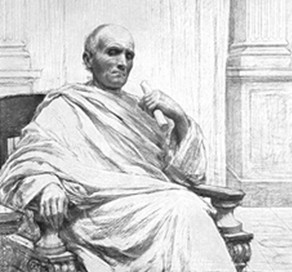Jesus was a great story-teller and people loved to listen as He taught through parables. The people understood the message of the parables because the stories dealt with ordinary, day-to-day experiences that they were all familiar with. But they loved these stories for another reason as well. Most of the time these stories disturbed the comfortable and comforted the disturbed. The parables would seem to point to an obvious conclusion, and then shock the listener with an unexpected ending. Jesus continually challenged conventional wisdom, and He so upset the leadership of his time by his parables that they eventually began to plot a way to get him out of the picture.
 The parable in today's gospel is particularly interesting as it is itself capable of being turned upside-down and inside-out. It seems to be a parable about the need to pray constantly and never lose heart. It gives the picture of two people - an unjust judge who had neither fear of God nor respect for people, and a widow who came to him time and again looking for justice. For a long time he ignored her and refused to listen. But at last he tired of her and granted her wish out of sheer expediency. The immediate understanding of the parable would be to say that just as the judge heard the widow because of her persistence, so too God will hear us if we persist in our requests.
The parable in today's gospel is particularly interesting as it is itself capable of being turned upside-down and inside-out. It seems to be a parable about the need to pray constantly and never lose heart. It gives the picture of two people - an unjust judge who had neither fear of God nor respect for people, and a widow who came to him time and again looking for justice. For a long time he ignored her and refused to listen. But at last he tired of her and granted her wish out of sheer expediency. The immediate understanding of the parable would be to say that just as the judge heard the widow because of her persistence, so too God will hear us if we persist in our requests.
But I think it's little strange for Jesus to identify God with an unjust judge. To say that our petitions are answered because of our nagging God into action rather than because His is a true concern for justice just doesn't seem right. All throughout the Scriptures, God identifies with the widow and the orphan, the poor and disenfranchised. Jesus' understanding of God would not be different. So, maybe the point of His story is much different from the obvious.
Perhaps it is we who are the unjust judges who neither fear God nor respect people. In the measure of this world, the vigilant and wise person is the one who keeps his wits about him, the one who watches his chances and makes the right moves, the one who doesn't let himself be beaten. We can be dominated by our egos and be stubborn in our self seeking. We easily put ourselves and our own agenda above the plight of our less fortunate brothers and sisters. We can easily look the other way at injustice and suffering when it doesn't affect us directly. People without power and influence are easy to brush aside.
But our God is persistent in His love for us. He wears us down like the widow by persistently pursuing us and constantly nagging us. We see God as constantly trying to break down our defenses and we see prayer as allowing this pursuing God to enter our lives and challenge us to a true conversion of heart.
If the corrupt judge, who fears neither God nor people, will give justice to a defenseless widow simply because of her insistence, how much more will God give justice to those people who cry out to him for it night and day? God is not only interested in justice but He swiftly responds to our cries for it.
Jesus' final question is an interesting one: "And yet, when the Son of Man comes will he find faith?" The Lord longs for our participation in His plan. He doesn't wait for the answer because he knows it already. He encourages us to keep working towards the Kingdom, to keep praying for it, and to never give up. Faith and persistence are the two inseparable elements of discipleship.
It is important for us to remember that Jesus is never one to ask the impossible, only the unlikely and unimagined.
Discipleship is indeed demanding and no one of us can do it alone. It requires new kinds of relationships, new kinds of community. It demands imagination, vision and total commitment. All He asks from us is everything that we are. And He is telling us that we have something really important to offer one another - something really helpful, something life changing.
Included Graphic: "The Unjust Judge" - Eugene Burnand





